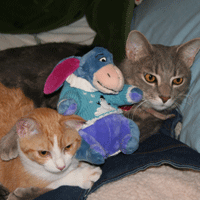Biodiversity, Global Warming, and the Future

It's a cold night. You wake up, curled in a little ball, shivering, and you remember that there is a nice, warm blanket in the hall closet. What do you do?
- Stay in bed, because if you get up, your pajama pants, loose from your recent weight loss inspired by your lead role in the new blockbuster movie based on your bestselling novel, will fall off, and losing your pajama pants will make you colder than before.
- Stay in bed, because if you get up, your significant other, the handsome/beautiful actor/actress (choose one of each) who will play the lead next to you in the new movie, will steal the covers already on the bed, you won't notice, and you'll end up colder than before.
- Stay in bed, because if you get up, you'll spill the glass of imported water with the lemon slice that you keep next to the bed for your significant other, soaking the sheets and making you colder than before.
- Get up and get the blanket.
If you picked D, you probably should be thinking about wise responses to global warming, because the physical basis for expecting that the ongoing human addition of carbon dioxide to the atmosphere will raise the Earth's average temperature is about as strong as the physical basis for expecting warming from putting another blanket on the bed. Nature might do something bizarre and offset what we're doing—a huge number of volcanoes might erupt and throw things into the stratosphere to block the sun, or space aliens might come and get in the sun's way—but we're putting a blanket on the planet, and the planet is likely to get warmer.
However, that doesn't tell us what, if anything, to do, so let's go take a look at the options. There's some money to be made here, for you business majors, and engineers, and everyone else.
What to do for Unit 12?
You will have one week to complete Unit 12. See the course calendar for specific due dates.
As you work your way through the online materials for Unit 12, you will encounter a video lecture, several vTrips, some animated diagrams (called GeoMations and GeoClips), additional reading assignments, a practice quiz, a "RockOn" quiz, and a "StudentsSpeak" Survey. The chart below provides an overview of the requirements for this unit.
| REQUIREMENTS | SUBMITTED FOR GRADING? |
|---|---|
| Read/view all of the Instructional Materials | No, but you will be tested on all of the material found in the Unit 12 Instructional Materials. |
| Submit Exercise #6: Fossil Fuels (& Driving Hazards) | Yes, this is the last of 6 Exercises and is worth 5% of your total grade. |
| Take the Unit 12 "RockOn" quiz | Yes, this is the last of 12 end-of-unit RockOn quizzes and is worth 4.5% of your total grade. |
Questions?
If you have any questions, please feel free to email "All Teachers" and "All Teaching Assistants" through Canvas conversations.
Keep Reading!
On the following pages, you will find all of the information you need to successfully complete Unit 12, including the online textbook, a video lecture, several vTrips and animations, and an overview presentation.

Students who register for this Penn State course gain access to assignment and instructor feedback, and earn academic credit. Information about registering for this course is available from the Office of the University Registrar.